

Researcher Support Library Services: PhD Thesis submission
- Library Resources for Research - Effective Literature Searching & Reference Management
- Open Scholarship & Impact
- Research Data Management & Data Management Plans This link opens in a new window
All postgraduate research students are required to deposit an electronic copy of their thesis into PEARL, the university's Open Access research repository. Older research theses have also been digitized from Library holdings and added to PEARL.
Guidance on depositing your thesis
Depositing your thesis.
The submission form will ask you to select an embargo period and give an option to licence your work. You will need to be aware of any copyright issues (for example, including published versions of your articles, images etc.) and seek permissions or redact material accordingly. The document gives a permissions seeking template and will advise on how to edit your document.
For any queries on this process please contact [email protected]
*** CLICK TO DEPOSIT YOUR THESIS ***
choose the top link: "University of Plymouth account" log in using your username (not email) and password
- Guide to depositing your e-thesis
Requesting embargos
Should i stipulate an embargo, what is an embargo.
An embargo is a temporary lock applied to your thesis that prevents public download until the end of the embargo period. Your thesis is still discoverable in Pearl (and via web searches) and the abstract will be visible. The file itself will show a padlock icon which will automatically unlock at end of the specified period.
Should I select an embargo period?
Increasingly, funders and institutions are moving to a position of immediate openness of research outputs. We recommend making your work immediately Open as this aligns with Open Scholarship principles including funder mandates to be open in research outcome dissemination; increasing your visibility to be cited; and credits you with your ideas date/time stamped with an appropriate re-use licence (if CC is selected) should others wish to re-use your work.
Embargo options in Pearl:
PGRs can select from 3 options in the PEARL thesis self deposit process that can be applied automatically at the point of deposit:
- 6 month embargo
- 12 month embargo
There is a 4th option for an Extended Embargo period (of longer than 12 months) for which you will need to complete a form and gain Supervisor approval:
Extended embargos:
1. Deposit your thesis using the link above and select a 12 month embargo when prompted.
2. Then please complete the below form and forward emailed approval from your DoS to the address given in the form:
- Extended embargo approval confirmation
3. Your extended embargo period will be applied once your thesis deposit has been approved by the doctoral college.
Scenarios where you may need to embargo your work:
Publications pending.
Students may wish to embargo for purposes of future publication opportunities based on your thesis. However, these days, many publishers do not view thesis publishing as prior publishing and in any case would usually require a substantial review of structure for a new audience. Therefore, to publish from your thesis is rarely a reason to apply an embargo period.
PEARL is a non-commercial archive of University outputs. Most publishers are understanding of the purpose of open theses via repositories and have stated that an open thesis is not considered prior publication. Some of the big publishers who support this are:
- Nature : "[we] are happy to consider submissions containing material that has previously formed part of a PhD or other academic thesis which has been published according to the requirements of the institution awarding the qualification"
- Elsevier : "To avoid any doubt, Elsevier does not count publication of an academic thesis as prior publication."
- Wiley : "The following types of “prior publication” do not present cause for concerns about duplicate or redundant publication:....Dissertations and theses in university archives."
Including your own published articles in your thesis
If you have published articles you would like to include in your thesis you will need to consider whether you signed your copyright away to the publisher upon publication. Most authors do find that their publisher owns the copyright of their work (unless money has been paid to the publisher to make it Open Access). If your paper is behind a paywall you can usually include the author's accepted manuscript version into your thesis.
Accepted Manuscripts : this the version of your work that has been through peer review with revisions made. It has not yet been typeset by the publisher. It will likely be a word document. The publisher's copyright policy often states you are permitted to share these versions publicly subject to an embargo period.
You can check your publisher's embargo period for your journal using the Sherpa tool: http://sherpa.ac.uk/romeo
If your journal requires an embargo you can select this within the deposit workflow in PEARL. Remember that the embargo applies from the date of publication of the article, not your thesis deposit. Depending on when your paper was published, the embargo may already have elapsed.
Patents/Commercial Sensitivity
This is a common reason for requiring an embargo.
Using copyrighted material
Using copyrighted material.
Find out about Fair Dealing and whether you need to seek permission for including copyrighted materials in your published thesis:
Copyright advice for researchers
Licencing your thesis
Choosing a licence for your thesis.
You can choose to be as open or as restrictive in your licencing of your thesis as you wish. Most research funders require an open CC-BY Creative Commons licence for outputs of funded research. CC-BY is the most open of the Creative Commons family of licence types where the author retains copyright and should always be credited as the creator of the work but permissions do not need to be sought by others for reuse, adding to, remixing or commercial gain. Funders require CC-BY as they wish to remove permissions barriers to future researchers.
Pearl offers the following licencing options:
- Public Domain & CC0 (we advise against these options as this is relinquishing copyright and giving your work away)
- Creative Commons licence (recommended, see below)
- No Creative Commons licence (we advise against this as it means 'all rights reserved' with no further guidance explaining how people may use your work. Beyond Fair Dealing, people would need to seek permission from you. Once you have left Plymouth, you may be hard to track down.)
Creative Commons branching options in Pearl:
- Allow commercial uses of your work (yes or no)
- Allow modifications of your work (share alike, yes or no)
The Creative Commons licence for your thesis will depend on the options chosen above. See the CC licences for more detail on what commercial, share alike etc. means. (The Library recommends non-commercial as your thesis is not published for commercial gain, however, this is entirely your choice).
What are Creative Commons licences?

CC licenses provide clear indication of how work may be used, reused and distributed. There is a standard, machine readable logo for each licence type and the general public clicking on these logos will find a clear explanation of how the work can and cannot be used. Creative Commons licences can be as restrictive or as Open as required. Often, they are used by creators and authors to remove some of the barriers to reuse of their work to encourage future development.
There are six main Creative Commons licenses - you can find out more about these on the Creative Commons website .
Thesis submission: Key resources
- Recorded session and slides A previously recorded session available via the Doctoral College's DLE (Moodle) site.
Further support
- Academic process and regulations: [email protected]
- Technical support with submission: itselfservice.plymouth.ac.uk
- Copyright and embargo queries: [email protected]
- Last Updated: May 2, 2024 9:41 AM
- URL: https://plymouth.libguides.com/research
Undergraduate projects published in Plymouth Student Scientist
The plymouth student scientist e-journal, undergraduate publications..

The Plymouth Student Scientist e-journal seeks to make the research process more accessible and explicit, by highlighting examples of good practice from across the University of Plymouth STEM disciplines. To encourage students to become more reflective and critical of their own research skills, they should consider the work of their peers with this aim in mind. The minimum criterion for publication in the journal is a first class honours project mark. All the journal articles are presented, largely, in their original state (Stage 4 dissertation) complete with imperfections.

- PEARL Home
04 University of Plymouth Research Theses
By Issue Date Authors Titles Subjects By Type
Search within this community and its collections:
Research theses from Plymouth University post-graduate research students
Copyright and License
All content is owned by authors who have licensed the University to host copies of their works.
Collections in this community
01 research theses main collection, 02 dclinpsy research portfolios, recent submissions.
The Relationship and Interaction Process of Taiwanese Couples Having Undergone Assisted Reproductive Technology- A Systemic Perspective
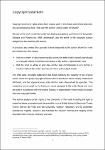
Silence in Market Reaction to Annual Reports
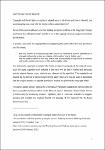
The assessment-related logics of practice at a South West Multi-Academy Trust
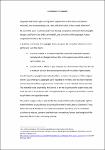
An exploration of preconception care for people with health conditions using realist methodology: what works, for whom, and in what circumstances?
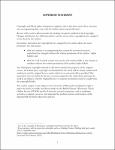
Film Here Now: Daily Filmmaking and the Path to Well-being
Outside of the Box: Narratives of Aromantic and Asexual Erotic Embodiment
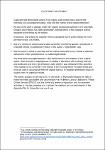
The Reconstruction of Climate in Beringia by analysis of Glycerol Dialkyl Glycerol Tetraether (GDGT) Distributions using High Performance Liquid Chromatography – Mass Spectrometry (HPLC-MS).
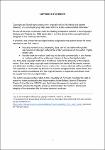
Knowledge Construction and Multiple Realities: Global Health Collaborations, Development Practices, And Face Masks in The Context of Covid-19
Physical drivers of ecosystem change throughout the tropical indian ocean .
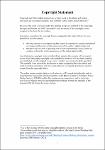
Exploring parents’ and teachers’ experience of a novel programme: SAFE with Schools [SwiS] – a systemic attachment-based approach for caregivers of autistic children
Dissertations
[ Back ] [ Home ] [ Who to Talk to ] [ Study Skills ] [ Library ] [ Things to do ] [ Regulations ] [ Welcome ]
Browse through the information below for general advice on the different aspects of a dissertation.
You can download the advice in the following sections as a complete guide here.
Getting Started
What is a dissertation.
A Dissertation is a major assessment task, sometimes labelled as an Honours Project, Independent Study Module or another module of 30 credits or more with a single assessment point. They typically involve researching a topic which has been agreed and approved by a programme tutor. Information on these will be found in your Programme and Module Handbooks. (Extract taken from The Student Regulation Framework: Major Assessment Tasks )
A number of elements distinguish a dissertation from other assignments you might have undertaken:
- Independent – A dissertation is an exercise in independent study. Previous assignments might have had a great deal of guidance on the topic beforehand. A dissertation puts you in the position of researcher and subject-expert and is used to assess your ability to apply the principles of research to an original, independent project.
- Focus – The focus of your dissertation will be much narrower than any assignment you’ve had in the past. The purpose of a dissertation is to conduct a detailed examination of a topic in your discipline. You will need to consider multiple perspectives and demonstrate your understanding through the development of a new point of view.
- Length – A dissertation is substantially longer than other assignments, and for some students, it will be the longest piece of writing they compose in their whole life. An undergraduate dissertation can range from between 5,000 to 12,00 words depending on your discipline and your other modules.
- Structure – There are some components that will be present in every dissertation, and others will vary depending on the discipline or word count. A dissertation is typically structured by major chapters and other minor elements. Specifics will be detailed in your module handbook.
- Weight – A dissertation will have more module credits and therefore, will account for a larger percentage of your mark. You should be able to find specific details about this in your module handbook.
Before you do anything else
Word count – Find out the word count for your dissertation. This will allow you to plan how many words should be dedicated to each section.
Academic writing in your discipline – Clarify if your discipline has any specific conventions to adhere to during the writing process, for example, if the use of first person is permitted or if subject-specific terminology requires an explanation or a glossary.
When and how you must submit your dissertation – Get the due date in your calendar! Find out exactly how you need to submit your dissertation. Typically, you should submit a copy via Turnitin and submit a printed and bound copy to the Student Admin Office. You can get your copy printed and bound via the University Copyshop.
Know who your supervisor is – Every undergraduate conducting research will be assigned a dissertation supervisor. You will be assigned to an academic at Marjon with expertise in your chosen topic. Therefore, your supervisor might be someone you have never met before. Don’t underestimate the value of your supervisor; make every effort to attend all meetings and take on board their feedback and advice.
Familiarise yourself with dissertations – Make use of the Dissertation PCs in the Library to view other Marjon undergraduate dissertations. Getting acquainted with the style, content and structure of a dissertation early on will get you off to a good start and allow you to implement similar techniques in your own report.
Developing your research question
What do we mean by a research question?
Put simply, a research question is a narrow focus or ‘question’ which you will plan and build your independent research around. It’s important to note that your research question is by no means set in stone from the minute it is devised, but is used to guide your reading and research, in order to maintain focus and direction. A research question needs to be:
- Clear – It provides enough specific information for the audience to be aware of the nature and purpose of the research without requiring additional information.
- Focused – It is narrow enough to allow an adequate explanation within the confines of the word count.
- Concise – It is expressed in as few words as possible.
- Complex – It isn’t answered by ‘yes’ or ‘no’ but rather through an examination of a number of influencing factors and perspectives.
- Debateable – It naturally lends itself to debate or argument and isn’t determined simply by accepted facts.
- Appropriate – It is appropriately related to your discipline or field of study.
(The George Mason University Writing Center, 2018)
Where to start?
One of the hardest parts of a dissertation is forming a research question that is narrow in focus but isn’t so narrow that it is impossible to find existing research! A dissertation should never be a demonstration of all you know about a topic. It should guide your reader through key argument. One piece of advice is to choose a topic that grabs your interest. A dissertation is a lengthy piece of work, so spend your time ‘doing what you love’, and you will have a much better outcome. Your dissertation supervisor is a great sounding board for these ideas. Here are some other things to ponder when considering your topic:
- Overly ambitious or challenging topics – You may want to change the world with your dissertation; but you probably want to graduate too! Your dissertation work will be governed by time constraints and your ability to be specific. There is no possible way you can write everything there is to know on a topic either, so be selective and realistic.
- Emotional links to topics – Sometimes, having an emotional link to a topic can make your research all the more meaningful, but in cases where it is likely to affect your well-being or stir up old memories, it is best to divert your focus. Dissertations by their very nature are meant to be objective pieces of research, so if you have an emotional connection to a topic, think how this might affect your research, your own ability and your own drive to complete the assignment.
- Contentious topics – If you feel particularly strongly or disgruntled by a topic, then it will be difficult to remain objective in your research. For instance, if your results challenge your expectations, then you might not be able to offer an impartial view or reflect on the research experience in full.
- Originality – If you are going to dedicate a great many hours to a piece of research, then you might as well make it worthy of that time and ensure that it is original. If you have an area where theorists or perspectives don’t agree, then this might be a good point to explore. If you admire a particular piece of research, try not to simply ‘replicate’ it, but rather put your own spin on it by changing some of the variables.
(Rudestam & Newton, 2001)
Narrowing it down

The Dissertation proposal
What is a dissertation proposal?
A dissertation proposal is “a careful description of what your dissertation will be about and how you intend to carry out the work involved until it’s completion” (Walliman, 2014, p. 67). You will be asked to submit a proposal for most courses, not only so your supervisor can check that your dissertation is within the realms of possibility and conforms to course requirements, but also so you can justify what you intend to do and why; how you intend to apply what you have learned over the course of your degree and how you will make a useful contribution to your discipline.
What should a dissertation proposal look like?
Each discipline will have specific guidelines on the structure of a dissertation proposal, so consult your module handbook or assessment guidelines. A proposal is typically no more than 2-3 sides of A4, to provide your reader with a snapshot of your planned dissertation. It will typically be divided into subheadings, which will vary according to word count and discipline, but typically, you will be expected to include aims and objectives, an introduction, a methods section, literature and research concepts or limitations.
The title problem
You will be expected to submit a dissertation title/ research question. Try to capture the main themes of your proposed research in the title so your reader is able to summarise what you will be doing from the title alone. If you are unsure where to start, try to identify themes by returning to your reading and picking out the key concepts that occur in the literature. Once you have these key concepts, illustrate the scope of your research with additional words that limit location or time. Remember, that this will be a working title: you are likely to tweak it as your research progresses.
Aims & objectives
You should aim to summarise the aims and objectives of your dissertation in no more than 3-4 bullet points. These should be a very focused summary of the reasons for your research and should lead your reader neatly into the subject background. You should also clearly set out the limitations of your dissertation here, so that the exact scope of the research is distinct.
Introduce the subject background
Your introduction needs to outline the current situation in terms of subject literature to your reader in a way that could be understood by anybody; not just subject specialists. Therefore, take extra care to make define any subject-specific terminology and any complex theories or concepts. Additionally, your introduction will need to convince your dissertation supervisor that you have undertaken adequate preparatory reading in the subject you intend to study. You can do this by:
- Introducing research conducted so far and what is has discovered
- Stating what has not been determined by research so far
- Introducing the need for research in this particular area in light of literature
The use of evidence from a wide range of sources will be crucial to your dissertation proposal. Don’t dismiss literature if it isn’t directly linked to your topic; look for any subtle, indirect links and pull these out to draw relationships between concepts. Your dissertation supervisor will tell you if you have missed any critical readings and might be able to direct you towards helpful resources.

The key to an excellent dissertation proposal is the ability to deliver your understanding, argument and research intentions succinctly. You will need to contextualise your research in a concise style. Be selective: you are not expected to deliver everything you know on the topic in your proposal; just enough to demonstrate that you have a clear understanding of the literature and how your research feeds into this.
You will need to detail how you intend to carry out your research and link your chosen methods to the research question. Be as clear as you possibly can, especially if you intend to use more than one method. Stipulate clearly which aim a method intends to address. This may require a bit of background reading on research methods. If you are unsure where to start, Skills You Need is an excellent introductory resource on research methods. Here are a number of things you could address in your methods proposal:
- State a research design
- Identify the research population – lay out the situation
- Select a sample – size, location, number of people
- Collecting data – through interviews, surveys, observations etc.
- Analysing data – through coding statistical tests etc.
(Walliman, 2014, p. 74)
Expected outcomes
You should include a few sentences on what you expect the outcomes of your research to be and predict who might benefit from the findings. The outcomes should be linked closely to the aims and objectives of the research and should be relative to your timeframe and resources.
What do I do with a proposal once approved?
The proposal will be an excellent foundation for your dissertation in terms of research and write up, so expect to refer to it regularly in order to plan your research. Eventually, the proposal will be superseded by the dissertation document itself, but it is helpful to keep a copy to keep your research on track.
Major Dissertation Chapters
The following sections will be an essential part of every undergraduate honours dissertation. You should refer to your module handbook for precise guidance. The following advice centres on the main components, structure and style of each chapter. This does not supersede any advice given to you by your dissertation supervisor or in module handbooks.
Click here for a Dissertation Chapter Checklist
Introduction
The purpose of the introduction
Mewburn, Firth and Lehmann (2019) liken a dissertation introduction to a map: your reader will never have encountered this exact piece of research, so the introduction needs to serve as guide to your reader on what’s to follow throughout the rest of your report. (See this guide to using signposts ). Additionally, your introduction should contextualise your research. You may find that broader background information is required to contextualise the literature referred to in your literature review, so the introduction would be the natural place for this to sit. However, don’t release all details of your research in the introduction; your reader just needs a taste of your research so they continue reading!
Introduction content checklist
Dissertation Tip #3
Don’t dismiss the value of a good introduction in a dissertation. You may find it easier to outline your introduction in the early stages of writing and then draft it thoroughly after you have completed the research and understand fully what you are introducing. This is because your ideas will develop over the writing and researching process and your introduction will need to reflect this process.
Further Resources
Skills You Need. (2019). Writing a dissertation: The introduction. Retrieved from https://www.skillsyouneed.com/learn/dissertation-introduction.html
Warwick University. (2017). Writing an introduction. Retrieved from https://warwick.ac.uk/fac/soc/al/globalpad/openhouse/academicenglishskills/writing/moreinfo/
Literature Review
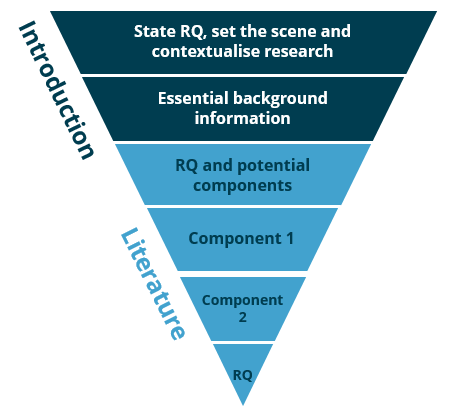
Your literature review is a major chapter in your dissertation and is your chance to present the current state of play for research in your chosen subject. You will need to consult the literature in your discipline to ensure that the research you are planning to conduct hasn’t already been carried out, and to justify why your chosen subject is worth investigation. Your literature review is the section of your dissertation where you begin to narrow your focus too, so you can examine all the nitty-gritty details of the research problem.
Dissertation Tip #4
You will need to refer to several sources in your literature review; some of these might be or be located in places you are unsure of. The University’s AIM sessions offer informative sessions on using Discovery, so you can optimise your searches, locate information quickly and make the research process easier. You can view all sessions and book on Learning Space.
What should I cover in my lit review?
The clue is in the title! You should be consulting a range of sources related to your research question and collating this information to provide your reader with a current state of events in your chosen subject. Here are some of the things you can look for in your dissertation reading:
- Theory – A consideration of your topic from the perspective of multiple theories and how they explain certain phenomenon. Draw upon the strengths and weaknesses of theories and compare and contrast them.
- History – How have we arrived at the current situation in your discipline? Examine problems or phenomenon that has developed over time, examine their consequences and argue whether it has helped or hindered the situation.
- Developments – What are the current ways of thinking in your discipline? What are the current problems and how are they being tackled? What conflicts exist within the subject?
- Research methods – what techniques have been used to research the issues so far? How has data been collected and analysed? How have the outcomes been explained?
(Walliman, 2014, p. 101)
Remember that you won’t be able to read absolutely everything that has ever been written in your field. The literature review is an iterative process; it will need to be drafted, adapted, edited and redrafted, so a source that is essential at the beginning of the process might be substituted for something more relevant at a later point.
Keeping a record
Throughout the dissertation process, it is vital that you keep a record of your reading so that you can easily refer back to material that you wish to include in your report and be able to track down details for citations. It can be difficult to know which parts of a source will be useful to your dissertation. For each source you read, write a summary in no more than 3 lines, so you will know the content at a glance. Create a standard way of noting themes, or papers that are essential. Appendix C has a reading chart as an example of how to standardise your notes, engage critically and make the most of your reading.
Further Resources for Literature Reviews
- 2 Turning an annotated bibliography on steroids in a proper literature review (pp 138-144) in Mewburn, I., Firth, K. & Lehmann, S. (2019). How to fix your academic writing trouble: A practical guide.
- Skills You Need. (2019). Researching and writing a literature review. Retrieved from https://www.skillsyouneed.com/learn/literature-review.html
Methodology
Purpose of a methodology
The methodology chapter is a justification for your chosen research methods in terms of philosophy and your research question (Skills You Need, 2019a). It needs to demonstrate exactly how your research was conducted so that it can be replicated step-by-step and so that your reasons for using certain protocol or methods is clear (Rudestam & Newton, 2001).
What should I cover in my methodology?
What you cover and how you write about these elements in your methodology will be largely governed by your use of quantitative or qualitative research methods. Broadly speaking:
Quantitative research tends to involve relatively large-scale and representative sets of data, and if often, … presented or perceived as being about the gathering of ‘facts’. Qualitative research, on the other hand, is concerned with collecting and analysing information in as many forms, chiefly non-numeric, as possible … and aims to achieve ‘depth’ rather than ‘breadth’.
(Blaxter, Hughes and Tight, 2010, p. 65)
Your methodology needs to be written in the past or present tense so that you can reflect on what methods were used, what went well and what you amended. It also needs to distinguish your research methods and your data collection methods and discuss them in terms of their pros and cons for your research.
You should also remember to include details on any equipment or procedures used, details about your participants and how you ensured the validity and reliability of your research. You should consult your module handbook for more information on the specific subheadings for inclusion in your methodology or consult texts on research methods to differentiate between the methodological details of qualitative and quantitative research.
Dissertation Tip #5
Marjon TELKit has a lot of tools you can use to facilitate your research methods such as online surveys, SPSS for statistical analysis and recording software for interviews. Ensure that any software you use can store data ethically and that you include the name of the software used in your methodology chapter for potential replication.
Often, research is dependent on the involvement of other people. This means you must conduct your research in a way that adheres to ethical guidelines; whether this is guidelines within your discipline, or the guidelines set up by Plymouth Marjon University , you should design your research in a way that is ethical, safe and respectful. Your methodology should have a subheading for ethical considerations, so you can demonstrate how these ethical guidelines have been followed throughout the research process, for instance participant consent, anonymity and the right to withdraw. Please be aware that you cannot carry out any research until you have received ethical approval.
Further Resources on Methodology
- Chapter 5 – The method chapter: Describing your research plan in Rudestam, K. E. and Newton, R. R. (2001). Surviving your dissertation: A comprehensive guide to content and process. (2 nd ed). Thousand Oaks, CA: Sage.
- Chapter 10 – What’s all this about ethics? In Walliman, N. (2014). Your undergraduate dissertation: The essential guide for success. (2 nd ). London, UK: Sage.
- Bryman, A. (2016). Social research methods. (5 th ). Oxford, UK: Oxford University Press.
Results & Discussion
Please note that this guide considers the results and discussion of your dissertation as one chapter. Some disciplines require separate chapters, so consult your module handbook for specific guidance.
Purpose of results
The results section of your dissertation is where you describe your results, or what has occurred. If you are using statistical tests, then this is the section where you would discuss statistical significance and whether it has been achieved or not. The results section should include charts, graphs and tables so that you can refer to them and ‘state what you see’. You should include snapshots of your results here including overall results, instances of high or low phenomena, and any anomalies. Your raw data will need to go into your appendices and can be referred to for specifics, such as answers in interviews. Make sure you guide your reader through what you consider to be the most important observations.
Purpose of discussion
The discussion section is where you review and link the findings from your research to the existing literature and critically evaluate your contribution against other research. Put simply, your discussion section explains why and should perform four major functions:
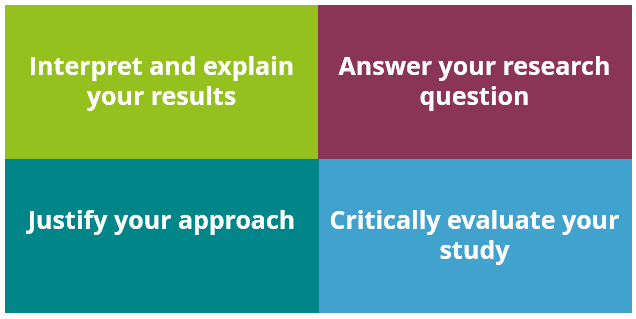
What should I cover in my results and discussion?
Think of your discussion section as a long, persuasive essay. It needs to refer to the readings in your literature review and any other sources you have deemed essential in light of your findings. It is important that your discussion is critical so that you can make appropriate links between your research question, the literature and your findings. This means building an argument to persuade your reader and using your results to construct an argument on multiple grounds:
- Agree with, defend or confirm a point of view you have found in the literature
- Propose a new point of view
- Concede on some facets of a theory, but use your results to warrant a re-examination of other facets
- Reformulate an existing point of view to provide a better explanation
- Dismiss another’s point of view on the grounds of inadequacy or irrelevance
- Reject or rebut the argument of another on various grounds
- Reconcile two positions that may seem at odds, but are connected
- Retract or reject your previous position in light of evidence or arguments
(Taylor, 2009, p. 112-113)
Dissertation Tip #6
Your discussion section will need to create a strong argument. The University’s AIM sessions include Advanced Critical Thinking which looks at how to create and write strong, persuasive arguments through the use of evidence, rejection of fallacies and evaluation of rhetoric.
Sources for Results and Discussion
- Chapter 6 – Presenting the results of empirical studies in Rudestam, K. E. and Newton, R. R. (2001). Surviving your dissertation: A comprehensive guide to content and process. (2 nd ed). Thousand Oaks, CA: Sage.
- University of Leicester. (2019). Writing a dissertation. Retrieved from https://www2.le.ac.uk/offices/ld/resources/writing/writing-resources/writing-dissertation
- ‘Where’s your evidence for this?’ : using what you know to make a case In Mewburn, I., Firth, K. & Lehmann, S. (2019). How to fix your academic writing trouble: A practical guide. London, UK: Open University Press.
The purpose of the conclusion
The conclusion is a chapter that should not be underestimated. The conclusion is your time to shine; your platform to state everything you have found out through your research and what this indicates. Furthermore, your conclusion is your chance to recommend as a practitioner in your field, so don’t pass up this opportunity in your dissertation writing!
Your conclusion should include:
- A brief summary of your key findings and essential results (try to avoid repetition of your introduction)
- An explicit account of the conclusions you have drawn from your research in relation to your research question, separating the confident conclusions from the uncertain
- An indication of why your research is important (to other researchers, practitioners, policy etc.)
- Recommendations for future research or future practice (within the realms of possibility!)
- A final statement to round off your dissertation; typically, a hedged prediction of the future or any explicit conclusions
(Skills You Need, 2019c; Taylor, 2009)
Reference List
A reference list is an absolutely essential component of your dissertation. every single work you mention in any chapter of your dissertation must be included in the reference list in the appropriate apa style. whilst there is no official guidance on how many references will sufficiently aid a dissertation, you should be reading widely and consulting more than just books and webpages..
Dissertation Tip #7
Don’t leave your reference list until last! Try using a referencing tool such as Mendeley to keep track of all your readings and automate citations for your dissertation report and the reference list. The University’s AIM sessions include Mendeley training and Organising Information , which equips you with the tools to manage your sources more effectively.
Additional Dissertation Sections
The following sections might be essential for some courses, but optional for others. Please adhere to your module handbook in the first instance, or clarify with your dissertation supervisor.
An abstract provides your reader with a ‘map’ to the structure of your dissertation and allows your reader to decide whether your dissertation is relevant to them (without reading the whole document). Your abstract should be written after you have completed your major chapters and therefore needs to be written in the past tense. It needs to describe the crucial elements of your dissertation in the fewest words possible, including:
- What the research question is and the aims and objectives
- Acknowledgement of a main theorist or theory (if applied)
- A short note on the main methods used
- A brief note on the major results
- Summary of the main conclusion and recommendations
An abstract should not include :
- Lengthy background information
- Waffle – be succinct and to the point
- Citations or references to other works
- Images, figures, tables
- Acronyms, abbreviations or subject-specific terminology
(University of Southern California, 2019)
TIP: Take a look at some of the journal articles you have read and note how they construct the abstract. These can act as a good model for this section of your dissertation.
Contents & Tables
Reports as standard require contents pages. You will need to include a table of contents, a list of figures and a list of tables so that your dissertation can be easily navigated. You can learn how to create these elements in your dissertation document, and more in the AIM Dissertation Formatting session. Book on Learning Space to attend!
Statement of originality
You will need to include a statement of originality in a standard format towards the beginning of your dissertation. This statement confirms that you have cited all sources within your work and that any work outside of these citations is your own. Good research is underpinned by academic integrity, including the acknowledgment of the work of others and having the confidence to undertake your own research and writing. Don’t fall at the final hurdle! If you are concerned about something, speak to your dissertation supervisor. Here is the exact statement that needs to be included:
I confirm that I have fully acknowledged all sources of information and help received and that where such acknowledgement is not made the work is my own.
Signed: …………………..
Dated: …………………..
Acknowledgements
The acknowledgements page is the part of your dissertation where you can thank anybody who has helped you during the research process. Typically, this should include your dissertation supervisor and any participants in your study; but be mindful of anonymity with the latter. The acknowledgements can extend to anyone you’d like to include and don’t need to be written in an academic style, as they are personal to you. However, don’t be unnecessarily offensive; your work will be viewed by many Marjon students in years to come, so set a good example!
A glossary is a list of key terms used in a specific context or technical terminology that might require some description in order to aid your reader’s understanding of the terms. A glossary is used to make your dissertation more available and accessible to a wider audience through clear explanations of words. You should only include a glossary if it is going to be of genuine use to your reader. A glossary should:
- Be alphabetical for easy look-up of terms
- Be restricted to words that your reader might need to clarify
- Not include acronyms – these should be included in a List of Acronyms if they are numerous

Bibliography/Supervision Log
A bibliography is a requirement for some disciplines, but not all. The same goes for a supervision log; this is a common requirement for teaching degrees. You should check your module handbook for any specific guidance. If you are required to include these, then they should be included directly after your reference list and listed in your Table of Contents. Your bibliography should be formatted in APA, alphabetically and with a hanging indent.
Remember: if you cite something from your bibliography in your dissertation then it needs to be moved to your reference list!
Think of your appendices as filing location for any essential documents that need to be submitted in conjunction with or referred to within your dissertation. Anything that supports or extends the main body of the dissertation should be submitted as an appendix. Traditionally, appendices are labelled A, B, C… with a short description of the contents, for easy referral within the main body of your dissertation. Things that typically get included in appendices are:
- Ethical clearance forms
- Consent forms
- Examples of blank questionnaires/interview questions/datasets
- Raw data from results
- Transcriptions of interviews or focus groups
- Coded data from thematic analysis
Your appendices are not suitable for the inclusion of material that you can’t fit into the allocated word count! If something is worth saying, the ensure you include it in the appropriate chapter of your dissertation and use artful editing to get within the word count limits.

Dissertations@Portsmouth
The University Library maintains a limited selection of undergraduate student dissertations, taught postgraduate student dissertations and MPhils in electronic form. See our policies and procedures for handling dissertations and requirements for acceptance as well as information about what is included in the selection.
Please note that some courses, including all Business and Law courses do not submit dissertations to this service. If you cannot find relevant dissertations here, please contact your tutor or check on Moodle.
To quickly find dissertations and MPhils by title or course, start typing keywords in the appropriate field below. Any matches will be listed in a dropdown - the more you enter, the more precise the result. Click on any item on the list to select it. Or click 'Advanced Search' to find items by title & abstract, author, date, department or course, alone or in combination.
Search for a title:
Search for a course:
Most recent additions to the collection
- Antwi, Abolanle (2024) An investigation into the increase of cybercrime during Covid-19 . (unpublished MSc dissertation), University of Portsmouth, Portsmouth
- Alikali, Moses (2021) The impact of free or subsidized malaria treatment on self-medication practices amongst people in rural communities in Taraba State Nigeria . (unpublished MSc dissertation), University of Portsmouth, Portsmouth
- Tanner, Javier Alejandro Perez (2021) Exploring factors for sustainable rural electrification projects through Solar Home Systems: Case studies in Argentina and Peru . (unpublished MSc dissertation), University of Portsmouth, Portsmouth
- Gill, Jane Elizabeth (2023) The Kraken at the fin de siècle: an ecocritical reading of literary representations of giant cephalopods . (unpublished MA dissertation), University of Portsmouth, Portsmouth
- Foulk, Kathryn (2023) Exploring the significance of improving the accountability of Non-Governmental Organisations to ensure optimal development within Sub-Saharan Africa . (unpublished BA dissertation), University of Portsmouth, Portsmouth
See more recent additions ...
University of South Florida
College of Engineering
Main navigation, usf college of engineering news, cse’s md. sadman sakib has received the dissertation completion fellowship.
- March 23, 2024

CSE PhD student, Md. Sadman Sakib, was selected by a university-level faculty committee to receive the Dissertation Completion Fellowship from the Office of Graduate Studies at the University of South Florida for the summer semester of 2024. The competitive fellowship is for full-time PhD students focusing exclusively on their dissertation; this year, ten such fellowships were awarded across the university.
Sadman joined the CSE PhD program in the Fall of 2019 under the guidance of Dr. Yu Sun at the Robot Perception and Action Lab (RPAL). He decided to pursue his PhD as early as his undergraduate years. “I was deeply intrigued by the prospect of conducting original research, having the chance to uncover new insights, and the opportunity to contribute to the advancement of knowledge in my field.” said Sadman.
“My thesis work focuses on developing advanced task planning algorithms, allowing robots to easily handle different real-world situations. This would equip robots with the ability to autonomously devise and execute tasks effectively based on natural language instructions. We have found that creating multiple plans using LLM and merging them into a combined graph yields more accurate and optimal results. Further, including a knowledge graph, particularly the Functional Object Oriented Network (FOON), improves the overall performance.” said Sadman.
“Receiving this fellowship has been an incredible honor and a significant milestone in my academic journey. It not only validates the importance and potential impact of my research but also provides invaluable support and resources as I work towards completing my dissertation,” said Sadman. “I am truly grateful for this opportunity and excited to continue my research with renewed commitment and focus.”
Return to article listing
Explore More Categories
- All Categories
- Alumni & Friends
- Civil Environmental
About Engineering News
News about engineering excellence by world class faculty, and outstanding students and alumni of the College of Engineering.
- Today's news
- Reviews and deals
- Climate change
- 2024 election
- Fall allergies
- Health news
- Mental health
- Sexual health
- Family health
- So mini ways
- Unapologetically
- Buying guides
Entertainment
- How to Watch
- My watchlist
- Stock market
- Biden economy
- Personal finance
- Stocks: most active
- Stocks: gainers
- Stocks: losers
- Trending tickers
- World indices
- US Treasury bonds
- Top mutual funds
- Highest open interest
- Highest implied volatility
- Currency converter
- Basic materials
- Communication services
- Consumer cyclical
- Consumer defensive
- Financial services
- Industrials
- Real estate
- Mutual funds
- Credit cards
- Balance transfer cards
- Cash back cards
- Rewards cards
- Travel cards
- Online checking
- High-yield savings
- Money market
- Home equity loan
- Personal loans
- Student loans
- Options pit
- Fantasy football
- Pro Pick 'Em
- College Pick 'Em
- Fantasy baseball
- Fantasy hockey
- Fantasy basketball
- Download the app
- Daily fantasy
- Scores and schedules
- GameChannel
- World Baseball Classic
- Premier League
- CONCACAF League
- Champions League
- Motorsports
- Horse racing
- Newsletters
New on Yahoo
- Privacy Dashboard
Columbia protester mocked after asking for food for occupiers
A pro-Palestine Columbia University protester has been mocked for demanding the Ivy League school provide students who had occupied a building with food and “basic humanitarian aid”.
In an impassioned plea, Johannah King-Slutzky, a PhD student in English and comparative literature, warned that students illegally occupying university property could “die of dehydration and starvation” if they were not given supplies.
“Like, could people please have a glass of water?’’ Ms King-Slutzky, 33, told reporters outside Hamilton Hall , which had been overrun by protesters.
“Do you want students to die of dehydration and starvation or get severely ill even if they disagree with you? If the answer is no, then you should allow basic... I mean, it’s crazy to say because we’re on an Ivy League campus, but this is like basic humanitarian aid we’re asking for,’’ she added.
A journalist replied: “It seems like you’re sort of saying: ‘We want to be revolutionaries, we want to take over this building, now would you please bring us some food and water’.’’
Responding, Ms King-Slutzky said: “Nobody’s asking them to bring anything.
“We’re asking them to not violently stop us from bringing in basic humanitarian aid.’’
Ms King-Slutzky then clarified that she was not sure if the university had tried to stop supplies being brought to the protesters.
“We are looking for a commitment from them that they will not stop it,’’ she said. “I do not know to what extent it has been attempted. But we’re looking for a commitment.’’
The protester also said she believed the university was obliged to provide food to any student occupiers who had paid for a meal plan as part of their fees.
On her website, which has now been taken down, Ms King-Slutzky described herself as a “video editor and full-service digital comms expert for progressive and leftist causes”.
The activist, who is from New York, was also a member of the student workers’ union. During strikes in 2021 she described herself and her colleagues as “lambs being raised for the slaughter”.
Ms King-Slutzky’s university research is focused on “theories of the imagination and poetry as interpreted through a Marxian lens in order to update and propose an alternative to historicist ideological critiques of the Romantic imagination”, according to her Columbia University profile, which has also been removed.
She is the daughter of psychologists Mitchell Slutzky and Beth King.
Reporter grills Columbia student after she demands the university help feed protestors occupying Hamilton Hall: 'It seems like you're saying, 'we want to be revolutionaries, we want to take over this building, now would you please bring us some food'.' pic.twitter.com/vNczSAM4T1 — The Post Millennial (@TPostMillennial) April 30, 2024
Mr Slutzsky, who runs a private practice specialising in dementia care, was most recently listed as living at a property on the Upper East Side which was put up for sale earlier in 2024 for $1.3 million (£1 million).
Her mother studied her PhD in clinical psychology at Teachers College Columbia in the 1980s, according to her LinkedIn profile.
In 2015 Ms King-Slutzky wrote a 2,360 word article on “the theory of normcore food” in which she described pickles, Greek yogurt and quinoa as “high-stakes trendy foods with loads of moral and aesthetic baggage”.
Earlier on Tuesday, videos of people passing food to women inside a gate at Columbia were shared online.
Protesters last week ate a diet of Pret-A-Manger sandwiches and $17 roasted mixed nuts, according to the New York Post.
Police arrested 119 people barricaded inside Hamilton Hall on Tuesday night, New York mayor Eric Adams said.
The protests have been raging at the university for almost two weeks and have spread to campuses in more than two dozen US states.
On Tuesday Joe Biden, the US president, accused the group at Columbia of hate speech and said their occupation was wrong.
Officials at Columbia have accused activists of vandalism, including breaking doors and windows.
Broaden your horizons with award-winning British journalism. Try The Telegraph free for 3 months with unlimited access to our award-winning website, exclusive app, money-saving offers and more.
Recommended Stories
Columbia protesters evicted from hamilton hall as campus demonstrations intensify. what do the protesters want — and will they get it.
Pro-Palestinian demonstrators continue to roil a number of major U.S. universities. They've made it clear they're against Israel's war with Hamas in Gaza, but what can they really do about the conflict in the Middle East from a college campus? Here's a look at what protesters are really demanding.
Hilton Honors American Express Card review: Lots of reward opportunities for Hilton loyalists
Loyal Hilton customers will love this American Express travel credit card with no annual fee and generous introductory bonus offers.
Audible is testing a cheaper plan in Australia
Audible is testing a cheaper subscription tier in Australia that sounds like an answer to Spotify’s audiobook push. The service’s new Standard plan gives you one free title per month, but your credits don’t roll over.
Biden says Americans have 'right to protest but not the right to cause chaos' on college campuses after another night of mass arrests. Here are the latest updates.
Police in cities and towns across the country have been deployed in recent days to clear pro-Palestinian demonstrators from a growing number of encampments and occupied buildings on college and university campuses.
What is the typical minimum balance required for savings accounts and CDs?
Some types of savings accounts come with minimum balance requirements. Here’s a look at the typical minimum balance needed to open a traditional savings accounts or CD.
Kelley O'Hara, 2-time World Cup champion and Olympic gold medalist, to retire after 2024 NWSL season
O'Hara was part of a golden era for USWNT.
Huawei has been secretly funding research in America after being blacklisted
Huawei has been secretly funding research in America after being blacklisted. The company has been funneling money through a Washington-based foundation and a research competition at universities.
EU plan to force messaging apps to scan for CSAM risks millions of false positives, experts warn
A controversial push by European Union lawmakers to legally require messaging platforms to scan citizens' private communications for child sexual abuse material (CSAM) could lead to millions of false positives per day, hundreds of security and privacy experts warned in an open letter Thursday. Concern over the EU proposal has been building since the Commission proposed the CSAM-scanning plan two years ago -- with independent experts, lawmakers across the European Parliament and even the bloc's own Data Protection Supervisor among those sounding the alarm.
What is maternal sepsis and why are Black women twice as likely to develop it? Here's what you need to know.
Sepsis is a life-threatening infection and is considered a major cause of maternal death.
Ford's April sales dip, but hybrids shipments surge
Ford reported April US sales that dipped slightly, but saw continued strength with hybrid and truck sales, highlighting the automaker’s pivot into those vehicles.
Homebuyers turn to ARMs as mortgage rates hover above 7% for third straight week
The rate of the popular 30-year fixed mortgage hit 7.22% this week, causing some buyers to turn to adjustable-rate loans.
Novo Nordisk sales up 26% driven by GLP-1s, misses 11% on Wegovy
Novo Nordisk CEO Lars Jørgensen tells Yahoo Finance the company is confident about a robust GLP-1 sales year despite missing Wall Street estimates.
The Fantasy Baseball Numbers Do Lie: One of 2024's true breakouts is hiding in Chicago
Fantasy baseball analyst Dalton Del Don exposes some fraudulent statistics as we near the close of Week 4.
CD rates today, May 2, 2024 (top APY reaches 5.15%)
If you’re on the hunt for today’s best CD rates, we’ve narrowed down some of the top offers. Learn more about CD rates today and how to open an account.
J.Crew is stocked with flattering one-piece swimsuits to heat up your pool days — up to 50% off
You'll be swimming in compliments thanks to the curve-hugging ruching, elegant ruffled necklines and feminine patterns
These $10 Hanes sweatpants are 'baby soft,' fans say — grab the top-sellers while they're 45% off
Already cranking up the air conditioner? Stay warm and cozy in these wide-waistband classics.
NBA playoffs: Bucks' Giannis Antetokounmpo doubtful, Damian Lillard questionable for Game 6 vs. Pacers
The Bucks face a 3-2 deficit against the Pacers heading into Thursday's Game 6.
How to watch the 2024 WNBA preseason: Caitlin Clark’s first Indiana Fever game time, channel and more
The WNBA preseason tips off this Friday. Here's how you can catch Caitlin Clark's first game.
The best digital torque wrenches of 2024
A digital torque wrench is a tool you should consider adding to your collection. It makes accurate measurements and applies the correct amount of torque.
TechCrunch Minute: Where CZ’s sentencing leaves the state of crypto
Four months behind bars and a massive fine, that's what CZ is getting from the government for his crypto exchange's misdeeds. There's effort by some in crypto to promote the technology element of blockchains over their well-reported ability to generate new gambling opportunities. Chris Dixon of a16z frames this in 'computer v casino' terms, which I think is reasonable.

- open search
From the latest big breakthrough to the most influential and inspiring figures on campus to Pitt in the community, Pittwire is your official source for what’s happening now.
- Health and Wellness
- Technology and Science
- Arts and Humanities
- Community Impact
- Diversity, Equity, and Inclusion
- Innovation and Research
- Our City/Our Campus
- Pitt Magazine
- Features & Articles
- Accolades & Honors
- Ones to Watch
- Announcements and Updates
- Life at Pitt
- Arts & Sciences
- Computing & Information
- Dental Medicine
- Engineering
- General Studies
- Health & Rehabilitation
- Honors College
- Public & Intl Affairs
- Public Health
- Social Work
- COVID-19 Response
- Sustainability
- Graduate and professional students
- Kenneth P. Dietrich School of Arts and Sciences

Subscribe to Pittwire Today
Phd student kale serrato doyen is a mellon/acls dissertation innovation fellow.

Kale Serrato Doyen, who is pursuing a PhD in history of art and architecture at the University of Pittsburgh Kenneth P. Dietrich School of Arts and Sciences, has been awarded a 2024 Mellon/ACLS Dissertation Innovation Fellowship . The program supports doctoral students in the humanities and interpretive social sciences as they pursue bold and innovative approaches to dissertation research.
Doyen is one of 45 awardees , selected from a pool of more than 700 applicants through a rigorous, interdisciplinary peer review process. Doyen’s research explores Black geographies in Pittsburgh through the photographic archive of Charles “Teenie” Harris, a 20th-century studio photographer and photojournalist for The Pittsburgh Courier. In her dissertation, “Mapping the Teenie Harris Archive: Photography, Community and Pittsburgh’s Black Built Environment,” Doyen will collaborate with local communities to digitally map Harris’ photographs, providing a spatial context to long-standing histories of displacement, social inequality and Black life in Pittsburgh.
The American Council of Learned Societies (ACLS) launched the program in 2023 with the support of the Mellon Foundation to advance a vision for doctoral education that prioritizes openness to new methods and sources, underrepresented voices and perspectives and scholarly experimentation. The awards are designed to accelerate change in the norms of humanistic scholarship by recognizing those who take risks in the modes, methods and subjects of their research.
Each fellow receives an award of up to $50,000, consisting of a $40,000 stipend for the fellowship year; up to $8,000 for project-related research, training, professional development and travel expenses; and a $2,000 stipend to support external mentorship that offers new perspectives on the fellow’s project and expands their advising network. With fellows pursuing their research across the country and beyond, ACLS will also provide opportunities for virtual networking and scholarly programming throughout the fellows’ award terms.
Employees, benefits open enrollment is May 1-15
Pitt is launching an office of sustainability in the health sciences, here are the speakers for pitt’s graduate school commencement ceremonies.
School of Visual Arts Annual BFA Thesis Exhibitions Celebrate Works by 33 BFA Seniors

Mason Burns (CFA’24), a soon-to-be graduate of the College of Fine Arts School of Visual Arts BFA painting program, touching up one of his pieces ahead of the 2024 BFA thesis exhibitions.
Shows featuring painting, graphic design, sculpture, and printmaking are on view through May 11
Sophie yarin, jackie ricciardi.
Last month, BU School of Visual Arts graduate students were celebrated in a series of MFA thesis exhibitions. Now, the 33 graduating seniors in the College of Fine Arts Class of 2024 have a chance to showcase their work.
This year’s two BFA thesis exhibitions comprise student work from four undergrad programs: painting, sculpture, printmaking, and graphic design. On view at the Faye G., Jo, and James Stone Gallery are works by painting, sculpture, and printmaking students, while graphic design theses are across the street at the 808 Gallery.
It’s a big year for CFA: the college is celebrating its 70th birthday— founded as the School of Fine and Applied Arts in 1954 —and last month, the School of Visual Arts celebrated its first graduating classes in the new visual narrative and print media and photography master’s programs. This year, there’s also an all-new undergrad program that will see its first cohort of students walk at this year’s Commencement: the BA program in art .
The BFA thesis exhibitions are free and open to the public. As with the 2024 MFA thesis shows , we’ve compiled a sneak peek of works from each program for a preview of what’s in store for visitors. The captivating artworks, revealing both the depth and diversity of the talent at work in the undergraduate programs, are on view through May 11.
BA Program in Art
Launched in fall 2021, this program combines traditional studio arts curricula with a special focus on liberal arts research—with an eye to galleries, libraries, archives, and museums as rich repositories of information. Four students graduate this year.
The BA Program in Art capstone projects are at Gallery 5, 855 Commonwealth Ave., through Saturday, May 11. Hours: weekdays from 7 am to 8:30 pm and weekends from 9 am to 8:30 pm.
Grounded in rigorous studio practice, the School of Visual Arts undergrad painting program sets high expectations for its BFA students. After completing the school’s interdisciplinary Foundation Program , where students from all majors concentrate on the fundamentals of drawing, painting, sculpture, and art history, student-painters are encouraged to explore their individual passions in media from oils to woodwork to bookmaking.
This year’s nine BFA painting seniors represent a mélange of artistic styles and scope—works range from traditional portraiture to fish-eyed trompe l’oeil to stylized cartoonism and beyond.

Consider the highly composed works by Mason Burns (CFA’24): perfectly arranged still lifes featuring objects—shells, feathers, pine cones, dried sea urchins—gifted to the artist by his photographer grandmother. His practice is inspired by hers—centering on the natural world, freezing it in time, his paintings serving as a visual diary.
Ryan Dempsey (CFA’24) also trains his focus on the natural world, but chooses to use natural landscapes—and, more specifically, natural light—as a juxtaposition to the harsh “blue light” of digital devices we’ve all become accustomed to. The result, a combination of printmaking and painting, evokes the lingering afterimages caused by flashes of violent light.
For her acrylic and colored pencil works, Hannan Roderick (CFA’25) uses an intuitive approach. Inspired by her own emotions and the workings of her subconsciousness, her paintings read like snatches of awareness (a glance, a reflection in a spoon, fish in a fish tank) that return, distorted and uncanny, in dreams.
The BFA Painting Thesis Exhibition is at the Faye G., Jo, and James Stone Gallery, 855 Commonwealth Ave., through Saturday, May 11. Hours: Tuesday through Saturday, 11 am to 5 pm.
Undergrads in the sculpture program meet in intimate groups, allowing them to work more closely with faculty and one another, as well as with visiting artists. The curriculum focuses equally on technique, experimentation, and developing a unique visual language and point of view for each artist.
This year, Bader Baroudy (CAS’24, CFA’24) is the sole graduating sculpture major. His method is directly influenced by a musician’s process of creation, derived from “a variety of musical artists’ lyrical world-buildings and sound palettes, dressed in a plethora of symbolic references emerging from mythological, theological, and biological sources,” he writes in his thesis statement.
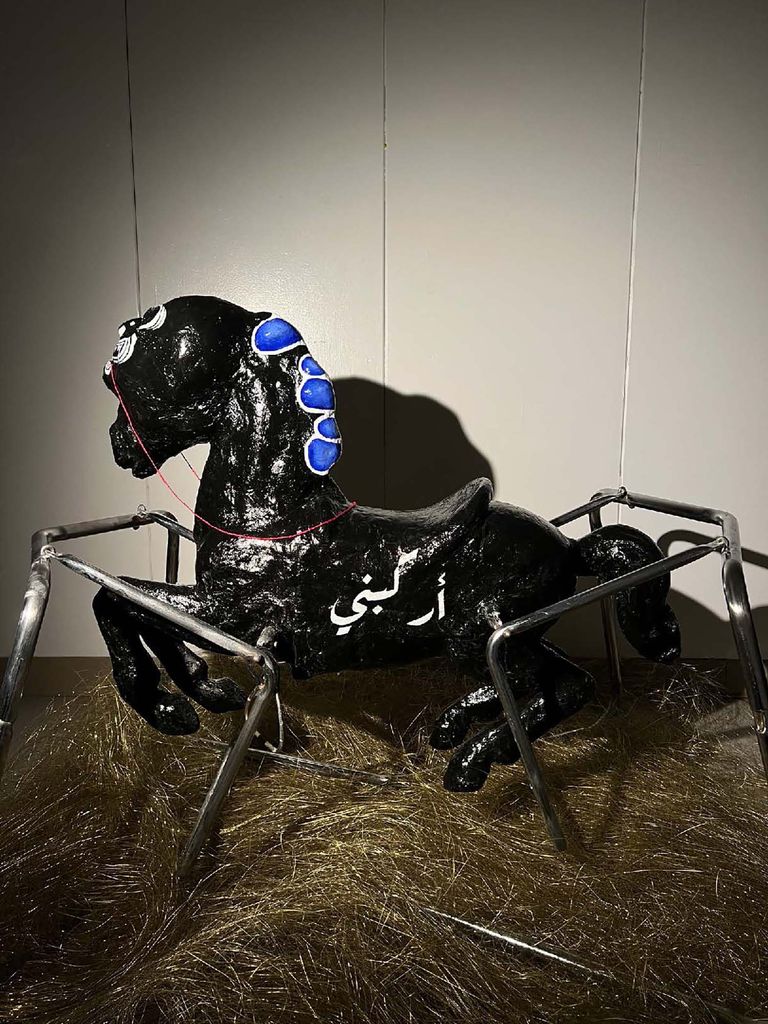
Baroudy’s installations are perhaps more directly reminiscent of films, given his use of evocative, cinematic set elements like pink LEDs, a repurposed hobbyhorse, and stark, weatherbeaten wood. And in fact, many of his sculptures incorporate short films.
The BFA Sculpture Thesis Exhibition is at the Faye G., Jo, and James Stone Gallery, 855 Commonwealth Ave., through Saturday, May 11. Hours: Tuesday through Saturday, 11 am to 5 pm.
Printmaking
From etching to woodcut to silkscreen to cyanotype, there are endless ways for contemporary printmakers to express themselves, and the BFA printmaking program offers a variety of media for undergraduate students to explore. Conscious of opportunities to engage in interdisciplinary practice, the curriculum offers young artists the freedom to incorporate digital art, painting, sculpture, and more into their work.
The two students in this year’s graduating BFA printmaking program capture the breadth of technical disciplines that the art form is known for, all while also showcasing their foundational talents in painting and drawing.
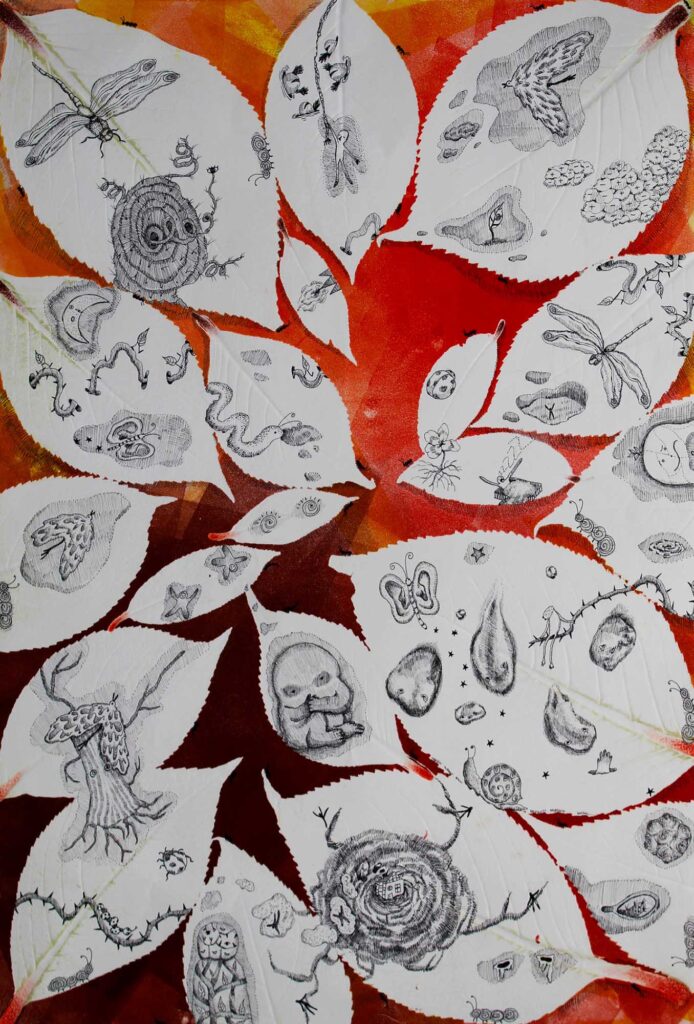
Dowon Suh (CFA’24) views her art as something of an alchemical process that allows her to transform internal turmoil and self-criticism into moments of hope. The fantastical creatures she creates and manipulates through etching and monotype are manifestations of these strong emotions.
Angela Pistilli (CFA’24), a double major in printmaking and painting, is also fascinated with characterization, but her focus is tightly trained on the female form. Much of her work is a reflection of her passion for weightlifting. Pistilli’s women are gender-defying, muscle-bound nudes engaged in traditionally masculine pastimes like chopping wood and hunting, each confronting the viewer with a confident swagger. “In this carefully constructed world,” she writes in her thesis statement, “women always win.”
The BFA Printmaking Thesis Exhibition is at the Faye G., Jo, and James Stone Gallery, 855 Comm Ave., through Saturday, May 11. Hours: Tuesday through Saturday, 11 am to 5 pm.
Graphic Design
Graphic design undergraduates concentrate their work in four key areas: design for social impact, community-focused design, the portrayal and exploration of social phenomena, and the intersection of technology and graphic design.
“Our shared passion for the transformative potential of graphic design binds our individual explorations together,” writes Mary Yang , a CFA assistant professor of art, graphic design, and thesis advisor for the 21 graduating students in the BFA graphic design program. “While our design approaches differ, we find convergence in our shared experience of design as a lens for critique, culture, and connection.”

Artist Drew Demeterio (CFA’24) uses her graphic design practice to probe the inconsistency between her Filipino background and American upbringing. Perceiving a dearth of Asian, and particularly Filipino, practices in contemporary design, Demeterio founded Kabilin, a Filipino arts collective, as part of her thesis. As with many of her designs, the logo melds Filipino visual influences with her own aesthetic ideals.
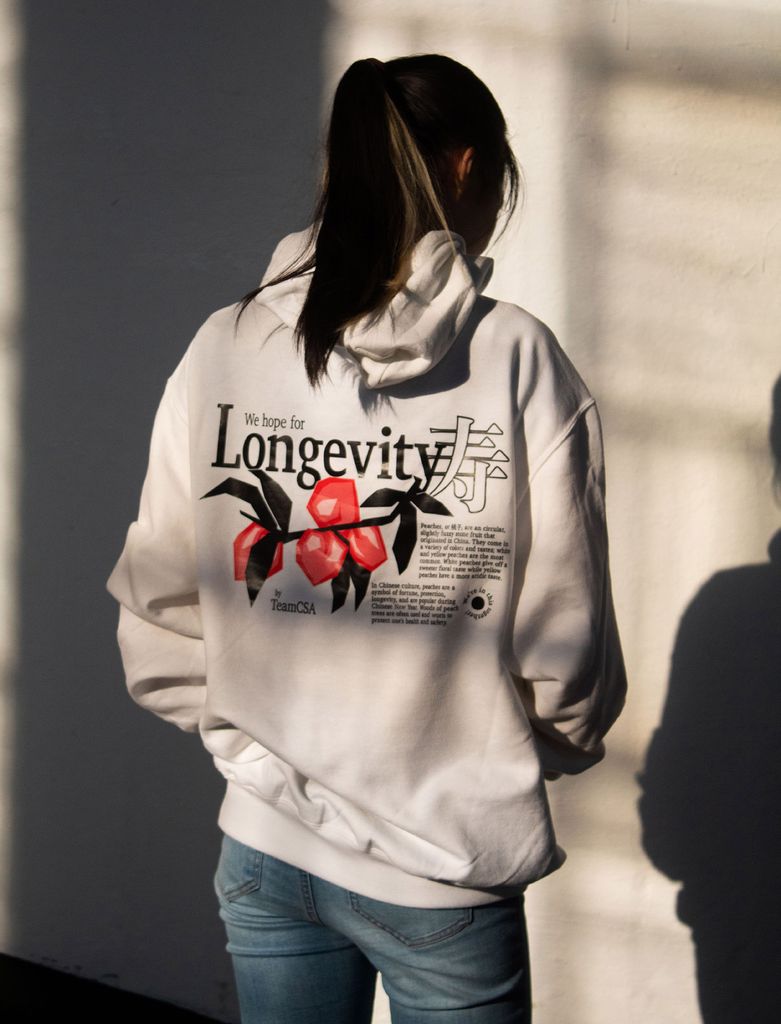
Sophie Jurion (CFA’24, COM’24) was inspired by the book Mismatch: How Inclusion Shapes Design , by former Microsoft graphic designer Kat Holmes, to create a thesis that explores life with one of the world’s most common disabilities: vision impairment. Incorporating elements like Braille, alternative text, and screen readers into her work, Jurion alters the interactive relationship between the work and the viewer, and prods the experience of seeing in playful and unexpected ways.
Vincent Liu (CFA’24) moved from China to New Jersey as a child, but writes in his thesis statement that he didn’t feel comfortable with his cultural identity until college. His thesis, incorporating typography and graphic prints, is a candid look at his motivations for “caring about my culture after a long period of neglect,” he writes. “My projects utilize a methodology…[derived from] the traditional Chinese mind-set of building something new rooted in the past.”
The BFA Graphic Design Thesis Exhibition is at the 808 Gallery, 808 Commonwealth Ave., through Saturday, May 11. Hours: Tuesday through Saturday, 11 am to 5 pm.
Opening receptions will be held at the 808 Gallery and the Faye G., Jo, and James Stone Gallery on Friday, May 3, from 6 to 8 pm.
Explore Related Topics:
- Arts on Campus
- College of Fine Arts
- Exhibitions
- Visual Arts
- Share this story
- 0 Comments Add
Associate Editor, BU Today; Managing Editor Bostonia

Sophie Yarin is a BU Today associate editor and Bostonia managing editor. She graduated from Emerson College's journalism program and has experience in digital and print publications as a hybrid writer/editor. A lifelong fan of local art and music, she's constantly on the hunt for stories that shine light on Boston's unique creative communities. She lives in Jamaica Plain with her partner and their cats, Ringo and Xerxes, but she’s usually out getting iced coffee. Profile
Staff photojournalist

Jackie Ricciardi is a staff photojournalist at BU Today and Bostonia magazine. She has worked as a staff photographer at newspapers that include the Augusta Chronicle in Augusta, Ga., and at Seacoast Media Group in Portsmouth, N.H., where she was twice named New Hampshire Press Photographer of the Year. Profile
Comments & Discussion
Boston University moderates comments to facilitate an informed, substantive, civil conversation. Abusive, profane, self-promotional, misleading, incoherent or off-topic comments will be rejected. Moderators are staffed during regular business hours (EST) and can only accept comments written in English. Statistics or facts must include a citation or a link to the citation.
Post a comment. Cancel reply
Your email address will not be published. Required fields are marked *
Latest from BU Today
Q&a: why are so many people leaving massachusetts, killers of the flower moon author, and bu alum, david grann will be bu’s 151st commencement speaker, bu track and field teams compete at 2024 patriot league outdoor championships this weekend, 22 charles river campus faculty promoted to full professor, this year’s commencement speaker we’ll find out thursday morning, the weekender: may 2 to 5, how to have ‘the talk’: what i’ve learned about discussing sex, university, part-time faculty tentatively agree to new four-year contract, pov: campus antisemitism can be addressed by encouraging more speech, not less, does caitlin clark signal a new era in women’s sports, a video tour of myles standish hall, student entrepreneurs competed for a chance at $72,000 in prizes at innovate@bu’s new venture night, all of boston’s a stage, bu plays a big role in new production from boston’s company one theatre, what’s hot in music this month: new albums, local concerts, coming-of-age story of immigrant child wins big at redstone film festival, does “tipping fatigue” justify paying minimum wage to tipped workers, student documentary explores the legacy of charcoal, a magazine by and about students of color, bu hosts first-of-its-kind queer food conference.
- Kansas State University
Status of ITS resources
- K-State home
- » K-State News
- » K-State graduate students named Phi Kappa Phi Dissertation fellows
K-State News
- K-State Today
- Seek research magazine
- Graduation/honors lists
K-State News Kansas State University 128 Dole Hall 1525 Mid-Campus Dr North Manhattan, KS 66506
785-532-2535 [email protected]
K-State graduate students named Phi Kappa Phi Dissertation fellows
Tuesday, April 30, 2024
MANHATTAN — The Honor Society of Phi Kappa Phi, the nation's oldest and most selective all-discipline collegiate honor society, has selected two Kansas State University graduate students as 2024 Phi Kappa Phi Dissertation fellows . Sachin Dhanda, doctoral student in agronomy, Hisar, India , and Chase Spears, doctoral student in leadership communication, Lansing , are two of only 15 students to receive the award. The $10,000 fellowships support active Phi Kappa Phi members in the dissertation writing stage of doctoral study. Dhanda and Spears were selected based on several criteria, including how the fellowship will contribute to the completion of the dissertation, the significance of original research and endorsement by the dissertation chair. "We are very excited for Sachin and Chase to receive the Phi Kappa Phi Dissertation fellowships," said Shawna Jordan, president of the K-State Phi Kappa Phi chapter. "They continue a legacy of students from Kansas State University receiving this fellowship to continue their education." Dhanda's dissertation research is focused on understanding the extent of multiple herbicide resistance among kochia populations across Kansas, Oklahoma and Texas. Additionally, he will develop integrated weed management strategies for controlling herbicide-resistant kochia and Palmer amaranth in the no-till dryland production system. Vipan Kumar, assistant professor of agronomy, and Anita Dille, professor and assistant head of teaching in the department of agronomy, are Dhanda's co-advisors. Dhanda said their guidance has been crucial to his work. Dhanda has authored 15 peer-reviewed journal articles, four extension publications and 21 abstracts from scientific presentations, and he has delivered seven guest lectures. Additionally, he received a North-Central Region Sustainable Agriculture Research and Education Graduate Student Grant to evaluate the potential of fall- and spring-seeded cover crops to manage herbicide-resistant weeds. At K-State, he is a teaching assistant for 300-level Weed Science and Soil Science courses. An active member in many professional and leadership activities, Dhanda serves as a student representative for the Western Society of Weed Science's Herbicide Resistant Plant Committee and a K-State Graduate Student Ambassador. He has served as secretary for the K-State Agronomy Graduate Student Association and the International Coordinating Council. Dhanda is a first-generation student, and he earned his bachelor's degree in agriculture from CCS Haryana Agricultural University in India. He holds a master's degree in agronomy from Punjab Agricultural University in India. "This prestigious fellowship not only recognizes the significance of my research in weed science but also underscores the importance of sustainable agriculture," Dhanda said. "I am grateful for Phi Kappa Phi's support, which will enable me to further advance agronomy and make a meaningful contribution to sustainable agricultural practices." Spears' research explores how the U.S. military violates its own rules through selectively applied apolitical norms that are enforced with greater weight than actual military policy and law. He has published peer-reviewed scholarship in the Public Relations Journal and Strategy Bridge as well as chapters in the books "Maintaining the High Ground: The Profession and Ethics in Large-scale Combat Operations" from Army University Press and "Internal Communication and Employee Engagement: A Case Study Approach" from Routledge. His commentary work has appeared around the nation in publications including The Washington Post, Los Angeles Times, The Federalist and Military Times. Spears is a regular contributor to the online journal The American Mind, published by the Claremont Institute. He has also taught crisis communication and public relations courses at Spurgeon College in Kansas City, Missouri, as well as a classical composition course St. Giles Christian Academy in Leavenworth. An Army veteran, Spears earned his bachelor's degree from Lee University. He holds a Master of Military Art and Science degree from the U.S. Army Command and General Staff College, a master's in professional studies in public relations and corporate communications from Georgetown University and a master's in science in journalism from the University of Tennessee. Spears was an Army Public Affairs Fellow at Georgetown University. He has delivered guest lectures at the University of Florida, the U.S. Army SHARP Academy and U.S. Army Recruiting Command. His other honors include Best Paper on the 24th International Public Relations Research Conference Theme, Kansas City IABC KC Quill for Promotional Writing, Fort Leavenworth Ethics Symposium Award for Best Paper, Georgetown University Spirit of Public Relations Award, first place in the U.S. Army Forces Command Fourth Estate Awards for Television Spot Production and second place in the U.S. Army Forces Command Fourth Estate Awards for Television Reporting. "It is one thing to be told that your research is important," said Spears. "It's another thing entirely for an organization to invest tangibly in you as a scholar, as patrons have done for the arts throughout history. My family and I are tremendously grateful for the practical aspect of this funding, and I am deeply honored by the show of support for my work that being a Phi Kappa Phi Dissertation Fellow demonstrates."
Media contact
Division of Communications and Marketing 785-532-2535 [email protected]
2024 Phi Kappa Phi Dissertation Fellows

Michelle Geering 785-532-0847 [email protected]
- Statements and disclosures
- Accessibility

- Manhattan, KS 66506
- 785-532-6011
- © Kansas State University
- Updated: 4/30/24

IMAGES
VIDEO
COMMENTS
Research students wishing to deposit their thesis or dissertation should follow carefully the instructions provided. Download full instructions: Depositing Electronic Theses - Guide for Students; Then, proceed to Deposit your thesis - when prompted, log in with your Plymouth University username and password (using the Plymouth University ...
Prospective student enquiries: Email: [email protected]. Phone: +44 1752 586951. Current student enquiries: Email: [email protected]. Professional Development Unit, Level 4 Rolle Building, University of Plymouth, Drake Circus, Plymouth, PL4 8AA, United Kingdom. Monday - Thursday 8:30-17:00 and Friday 8:30-16:30. Provides ...
PEARL is the open access research repository for the University of Plymouth. It safe-guards, preserves and provides access to a growing body of full text materials generated through the research activities of the University. University of Plymouth staff can deposit full text of research outputs on PEARL via Symplectic Elements.
Browse by. By Issue Date Authors Titles Subjects By Type. Search within this community and its collections: Masters dissertations from University of Plymouth students which have been released by the Faculty to the Library. Items in this community are available only to University of Plymouth staff and students.
Thesis presentation guidelines. Student representation on Doctoral College Board (DCB). It should be read in conjunction with the University-wide Academic Regulations (standard regulations for research degrees are combined with those for taught programmes).
Where you can go to within the university for further help. Please note: We recommend clicking to view full screen using the arrows and box icon in the top right. The tutorial can be made more accessible by selecting the three dots option in the top right and selecting accessibility view.
University of Plymouth Theses. Electronic full text PhD theses and some masters dissertations are stored in PEARL and they can be searched and accessed via PRIMO: 1. Make your search in Primo selectingPlymouth research outputs and thesesfrom the drop down menu. 2. The results list will contain details of both PhD theses and masters dissertations.
Therefore, to publish from your thesis is rarely a reason to apply an embargo period. PEARL is a non-commercial archive of University outputs. Most publishers are understanding of the purpose of open theses via repositories and have stated that an open thesis is not considered prior publication. Some of the big publishers who support this are:
University of Plymouth UNITED KINGDOM April 2017. i ABSTRACT ... Erdem Erciyes This thesis investigates the impact of culture, leadership, and power, on staff motivation in selected international organizations (IOs), and develops a theoretical framework to assist with the practice of workforce motivation. The main research question is: "How ...
The dissertation is the capstone of the MA Maritime History degree. Students choose a maritime or naval history topic that they are passionate about and research and write a dissertation of 15,000 to 20,000 words. ... The University of Plymouth library offers full access to a range of key databases, journals and books for postgraduate maritime ...
The University offers you the opportunity to gain your MSc in Advanced Professional Practice with this dissertation module. ... This 60 credit dissertation module will enable you to undertake a dissertation project appropriate to your chosen pathway. You will design, undertake and report on your research project and through this process deepen ...
Chapter 1: Moving from a Problem to a Problem of Practice. Chapter 2: Review of Knowledge and Action: Literature Review. Chapter 3: Methods and Designs for Action: Methodology. Chapter 4: Description of Findings and Recommended Actions. The reference list for the completed dissertation is placed after Chapter Four and before any appendix.
The Plymouth Student Scientist e-journal seeks to make the research process more accessible and explicit, by highlighting examples of good practice from across the University of Plymouth STEM ... in their original state (Stage 4 dissertation) complete with imperfections. 2023. George Modica-Cliff, Use of biomimicry model for the design of ...
The last sentence must state, "S/He is a candidate for the—degree in — from Plymouth State University in Month, Year." Printing and Packaging Specifications Because bound copies will be placed on shelves in Lamson Library, the following paper and printing specifications will help us preserve your thesis or dissertation for a longer ...
After graduation, the thesis will serve as a published contribution to knowledge, useful to scholars and general audiences. The purpose of this document is to outline the formatting requirements of your thesis. Therefore, the College of Graduate Studies, the Lamson Library, and the Graduate Faculty of Plymouth State University have established ...
Thesis Guide. Information for master's students preparing for, writing, or submitting their theses.
A Delicate Matter: The Madhouses of the South West of England, 1770 - 1851 . Barrett, Emma (University of Plymouth, 2024) This thesis examines the private madhouses of Somerset, Dorset, Devon, and Wiltshire during a period of great transition within the existing lunacy care landscape. Many madhouses pre-dated county asylums in provision ...
Please email [email protected] to arrange submission of your dissertation. Please plan to drop off two copies, plus any additional personal copies, and a PDF copy of your dissertation. ... Plymouth State University will cover the cost of two bound copies: one for the Writing Center and the other for Spinelli Archives ...
Completed dissertations must be submitted to Lamson Library before a final grade can be posted and the degree conferred. The ownership of the completed dissertation rests solely with the candidate. All of the contents, as well as all formatting, are the responsibility of the candidate. Two bound copies of the dissertation will be maintained at ...
A Dissertation is a major assessment task, sometimes labelled as an Honours Project, Independent Study Module or another module of 30 credits or more with a single assessment point. They typically involve researching a topic which has been agreed and approved by a programme tutor. ... PLYMOUTH MARJON UNIVERSITY IS A TRADING NAME OF THE ...
If you cannot find relevant dissertations here, please contact your tutor or check on Moodle. To quickly find dissertations and MPhils by title or course, start typing keywords in the appropriate field below. Any matches will be listed in a dropdown - the more you enter, the more precise the result. Click on any item on the list to select it.
PLYMOUTH, N.H. - The Plymouth State University Department of Athletics held its annual Panther Awards ceremony on Monday night, honoring individual student-athletes from each athletic program. The ceremony was held in Hanaway Theatre and recognized both senior student-athletes and each program's Panther Award winner.
CSE PhD student, Md. Sadman Sakib, was selected by a university-level faculty committee to receive the Dissertation Completion Fellowship from the Office of Graduate Studies at the University of South Florida for the summer semester of 2024. The competitive fellowship is for full-time PhD students focusing exclusively on their dissertation ...
A pro-Palestine Columbia University protester has been mocked for demanding the Ivy League school provide students who had occupied a building with food and "basic humanitarian aid".. In an impassioned plea, Johannah King-Slutzky, a PhD student in English and comparative literature, warned that students illegally occupying university property could "die of dehydration and starvation ...
PLYMOUTH, N.H. - A pair of Plymouth State University softball student-athletes were honored by the National Fastpitch Coaches Association as weekly top performers after another impressive week for the Panthers. Sophomores Emily Bessette (Cranson, R.I.) and Kenzie Bessette (Cranston, R.I.) were acknowledged by the organization for their ...
Kale Serrato Doyen, who is pursuing a PhD in history of art and architecture at the University of Pittsburgh Kenneth P. Dietrich School of Arts and Sciences, has been awarded a 2024 Mellon/ACLS Dissertation Innovation Fellowship.The program supports doctoral students in the humanities and interpretive social sciences as they pursue bold and innovative approaches to dissertation research.
The BFA thesis exhibitions are free and open to the public. As with the 2024 MFA thesis shows, we've compiled a sneak peek of works from each program for a preview of what's in store for visitors. The captivating artworks, revealing both the depth and diversity of the talent at work in the undergraduate programs, are on view through May 11.
MANHATTAN — The Honor Society of Phi Kappa Phi, the nation's oldest and most selective all-discipline collegiate honor society, has selected two Kansas State University graduate students as 2024 Phi Kappa Phi Dissertation fellows. Sachin Dhanda, doctoral student in agronomy, Hisar, India, and Chase Spears, doctoral student in leadership communication, Lansing, are two of only 15 students to ...